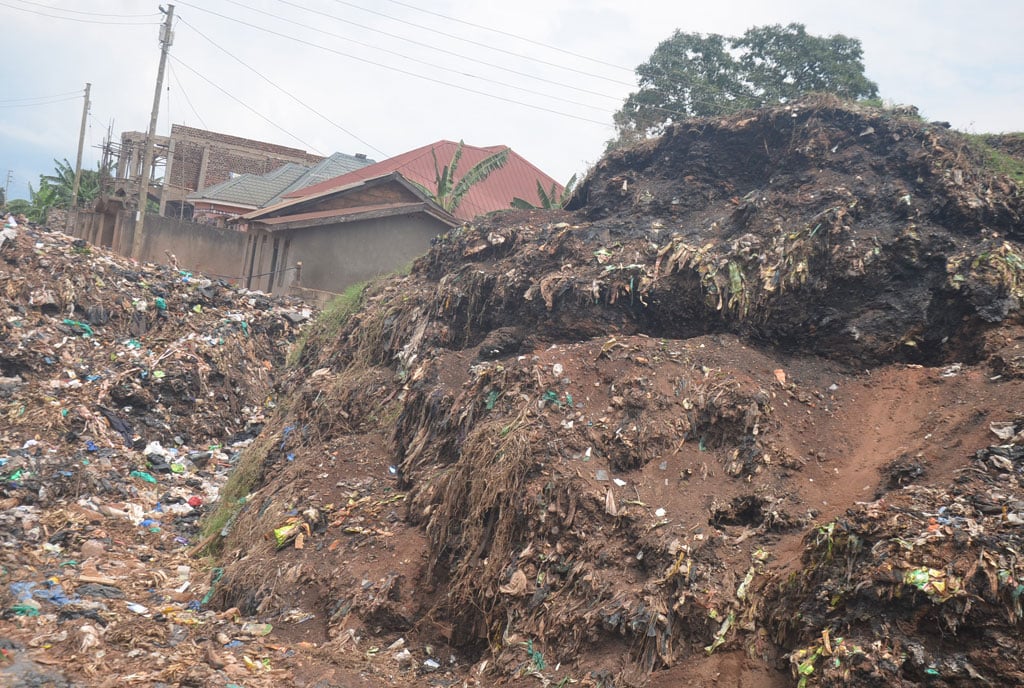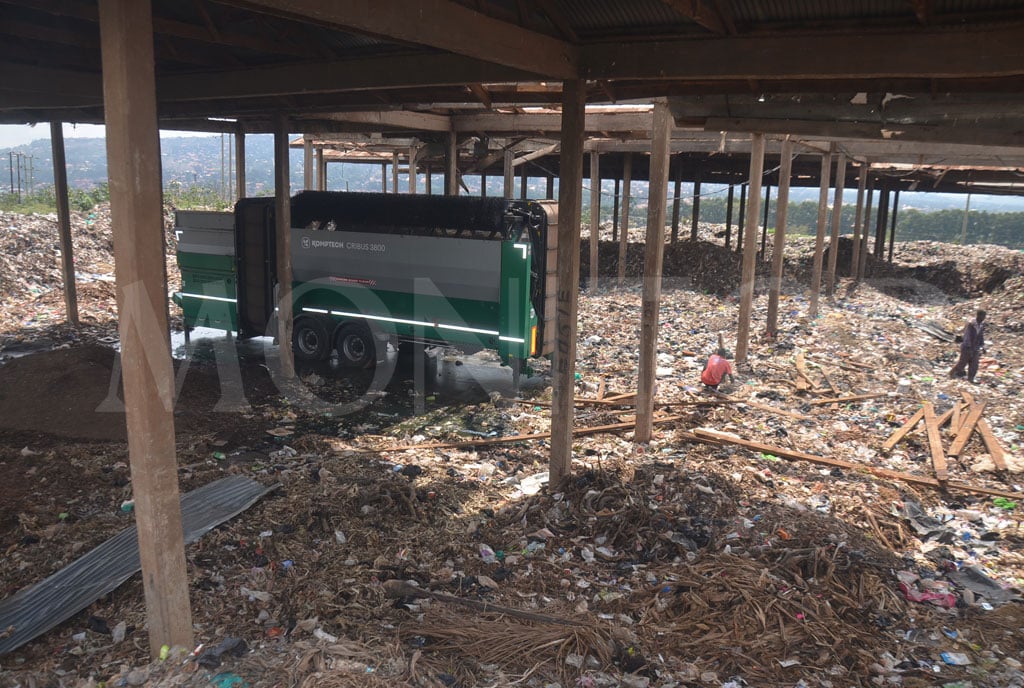
Residential houses at Masese landfill in Jinja City. Mr Ernest Nabihamba, the Jinja City senior environment officer, says $15m (about Shs55.4b) is needed to invest in a biogas plant able to generate electricity from this garbage. PHOTO/ TAUSI NAKATO.
To get a sense of the solid waste disposal problem that Uganda is currently grappling with, a trip to the landfill in Jinja that is enveloped by, among others, Masese Co Education Primary School, Jinja Ophthalmic Clinic Officers Training School and Kampala University – Jinja Campus, is instructive.
“All sorts of items like glasses, foetuses, diapers, among others, are dumped near our doorstep,” Eunice Akwende, who stays a stone’s throw from the landfill, revealed, adding”: “The stench and emissions from decomposing garbage attract flies…the place is full and our children risk getting diseases like cholera.’’
It was not meant to be this way five months ago when a Shs1.5b garbage recycling plant was commissioned to much fanfare. Its trommel machine (komptech cribus 3800), residents were told, has the capacity to turn garbage into manure. To cap things up, the machine was also famed for its capacity to sieve up to 50 tonnes of waste every hour.
“Jinja City doesn’t have the funds to purchase fuel; we are waiting for funds from the European Union to facilitate the operationalisation of the machine,” Mr Ernest Nabihamba, the Jinja City senior environment officer, told Monitor.
Mr Nabihamba also disclosed that $15m (about Shs55.4b) is needed to invest in a biogas plant able to generate electricity from the garbage heaps being dumped at Masese landfill.
“If the garbage recycling plant was working and the government gives us money for the biogas plant, we could generate 2.8 megawatts of electricity. The Ministry of Energy is convincing the government to invest in a biogas plant,” he said.
The tale of ‘ifs’ and ‘maybes’ in this industrial city is markedly similar to that of the capital in Kampala, where inactions culminated in a tragedy at the Kiteezi landfill that claimed 35 lives and counting.
“What happened at Kiteezi landfill in Kampala can happen to us anytime because garbage is dumped anywhere; when it rains, it floods. The landfill should be relocated to another place because it is currently in the middle of the city,” Mr Wilberforce Okware, the chairperson of Masese II Danida Cell in Jinja Southern Division, said.
A slew of problems
In an earlier interview with this publication, Rajab Kitto, Jinja City’s public relations officer, painted a troubling picture of a solid waste management plan.
“The road that goes to the landfill is murram and deteriorated…when it rains, it is very difficult for trucks to access the landfill,” he said in March, adding that the sheer volume of the solid waste generated means that the city’s 12-acre landfill can only do so much.
In July, 2009, the National Environment Management Authority (Nema), with funding from the World Bank, launched a manure project manufacturing site in Masese, Jinja South Division. It was, however, abandoned by the then leadership of the defunct Jinja Municipality.
Later, the Energy ministry, through the Nationally Appropriate Action on Integrated Waste Management and Biogas Production (NAMA) project, donated the Shs1.5b garbage recycling plant to Jinja City.
This followed a survey conducted by the ministry between 2021 and 2022. The survey revealed that Jinja generated an estimated 182.6 tonnes of solid waste each day. It also indicated that 8,041 metric tonnes of wastewater is generated by households, institutions, industries and commercial enterprises in Jinja City’s central business area daily.

This photo taken on August 18, 2024 shows a general view of a garbage recycling machine at the Masese dumpsite or landfill in Jinja City. PHOTO/TAUSI NAKATO
Jinja is not an outlier. In Iganga District, the landfill in Buruluza Village, Nakigo Sub-county, Iganga Municipality, per Mr Musa Ssengoba—the municipal speaker—is filling up. There is, however, slightly better news “since the houses are on top and [the landfill was] constructed below.”
MUST READ: Expert offers solution to garbage crisis
A dearth of funds, nonetheless, has resulted in the landfill being partially constructed. Power problems in the district also mean that any plans to install a recycling plant are off the table. For now.
“Six trucks of garbage are taken to the dumping site every day, but only half a truck can be recycled by the garbage plant after being sorted out,” Mr Ssengoba, said.
Similarly, in Mbale City, records indicate that the city council generates 150 tonnes of garbage per day, but the city council fails to collect it.
When it rains, it pours
According to the National State of Environment report 2016/2017, waste is characterised in forms of solid, electronics and wastewater.
Mr Julius Werikhe, an opinion leader in Mbale City, said Nema built a Shs1.2b garbage recycling plant in Doko ward, Mbale City meant to collect garbage in the city. The plant was, unfortunately, neglected by the city officials.
“It was supposed to turn garbage into manure, but it has been abandoned, forgotten, and vandalised as officials look on,” he said.
The recycling plant that was meant to address the challenges of solid waste management was part of the carbon trading deal with the World Bank. The compost plant started work in 2010. The World Bank-funded project was established to address the challenges of solid waste management under the Clean Development Mechanism (CDM). The CDM allows developed countries to reduce greenhouse gas emissions more cheaply by financing emission-reduction projects in developing countries, where costs are lower.
Mr Jackson Muhindo, the Climate Justice coordinator at Oxfam in Uganda, told this newspaper that poor garbage disposal has led to environmental damage in the city.
“Improper disposal of waste, such as plastic and toxic materials, has contaminated soil and water, harming ecosystems and aquatic life,” Mr Muhindo said.
He said open dumping or burning of waste releases harmful pollutants into the air, contributing to air pollution and respiratory issues.
“Overall, inadequate garbage disposal practices can have far-reaching and detrimental effects on the environment,” he said, adding that decomposition of organic waste in landfills in Mbale and other areas produces methane, a potent greenhouse gas that contributes to climate change.
Mr Sulaimani Were, an environmental expert, said the garbage collection system in Mbale City is poor and its management is wanting.
“Every road is littered. When it rains, you do not want to move in this town. The stench from the garbage is too much to bear,”Mr Were said.
Lost glory
When Monitor visited three markets in Mbale City, including the biggest, Mbale Central Market, Kikindu and Bugwere road market; garbage had blocked some roads.
A stroll along a narrow road that leads to Mbale Police Barracks on Market Street reveals an alarming sight. A heap of garbage mounts every other day, thanks, in no small part, to the residents and businesspersons around Mbale Central Market.
On that road, there is a line of shops, makeshift restaurants, salons, pharmacies, and Mbale Central Market. Vendors and other people often buy foodstuffs from these places, yet mounds of rotting garbage lie just beside the road.
Ms Stella Acham, an environmentalist, said besides garbage, there is poor disposal of human waste, especially in congested areas like Namatala, Kiteso, Nauyo, Nkoma, Mission cell, Mooni-Kikamba, among others.
“As a result people’s health is at risk,” she said.
The experts say due to the mass amounts of unsustainable, human-generated waste entering the environment, the detrimental effects of pollution have continued to negatively impact numerous ecosystems around Mbale City.

A woman passing near heaps of garbage at Mbale Central Market. PHOTO/YAHUDU KITUNZI
Between 1960s and 1970s, Mbale Town was the cleanest in East and Central Africa, but it now struggles with solid waste. In 2019, the then Mbale Municipal Council signed a deal with a Swedish investor to manage the town’s waste by turning it into energy/electricity. The project has, however, not kicked off.
Mr Edwin Muhumuza, the chief executive officer (CEO) of Youth Go Green, said poor garbage disposal contaminates the soil and water, releases harmful gases into the air, and harms wildlife.
“In Mbale City, the situation is particularly dire as the multi-million recycling plant remains unused, exacerbating the problem,” he said.
Mr Simon Joseph Owori, an environmentalist, urged the government to enforce the ban on plastic bags, commonly known as kaveera, in an attempt to eliminate one of the main sources of non-biodegradable waste in the cities.
Ms Rodha Nyaribi, the Mbale City senior environment officer, said Mbale used to recycle at least 30 tonnes of garbage every day. It would, she added, earn more than Shs3m “as local revenue per month after selling manure produced from the composite garbage.”
Mr Robert Kisesi, the councillor representing North Central Ward in Mbale Northern City Division, said three contractors are entrusted with collecting the garbage. They, however, lack capacity.
“The contractors are also overcharging the dwellers, forcing some locals to dump the garbage on the street at night,” Mr Kisesi said.
Mr Yasin Kawanguzi, a former speaker of Mbale Municipality, said the recycling plant project was never given priority by the council that “never recruited specialists and experts who would technically manage the plant to help in the recycling process.” As a result, added Abdallah Magambo, the Mbale City deputy speaker, part of the composite site land has been encroached on already.
“The city is losing lots of local revenue that they would have been got from selling compost manure if the plant was functioning,” he told Daily Monitor.
Mr James Kutosi, the spokesperson of Mbale City Council, said the recycling plant failed due to factors beyond its control. Its roof was, for one, blown off during heavy rainfall.
“Even the technology used in constructing the plant was not good. We expected a machinery sorting the manure but instead, it was people sorting it, which made it difficult to manufacture enough manure. It became a failed project,” Mr Kutosi said.
Mbale City Mayor Cassim Namugali, however, said the plans are on to revive the plant.
“We are going to reopen the abandoned recycling plant but we only have a challenge with lack of machines,” Mr Namugali said, urging traders and households not to put garbage in the middle of the road.
In Arua City, the recycling plant was established in 2011, with funding from the World Bank through Nema to recycle garbage into manure. According to the city authorities, the plant has been generating about Shs11m from manure sales.
“We are struggling with collecting garbage. Garbage takes a big chunk of our money,” Arua city clerk David Kyasanku said, adding that the population growth in the city means it needs additional garbage skips, graders, trucks and manpower to handle the garbage collection demands.

A worker carries garbage for sorting at the recycling plant at Ewuata in Arua City. PHOTO/ FELIX WAROM OKELLO.
Last year, the city designated at least 22 garbage collection sites. Currently, the city needs more than Shs100m to effectively manage garbage dumping sites in Ewuata.
Same old problems
Elsewhere, Joshua Edogu, the mayor for Soroti City, said they need nearly 10 lorries and wheel loaders to collect garbage from the city. He added that the central collection point at Aminit needs to be expanded.
Mr Abraham Omaido, the Soroti City East town clerk, put the constraints to garbage collection down to lack of funds.
“The money, when collected, has first to go to the centre and a fraction, which is given back, comes late, leaving the urban authorities unable to collect rubbish in time,” he said.
Mr Richard Muhumuza, the mayor of Central Division in Fort Portal City, said they have a central dumping site at Kitere, which requires repair.
“The situation is not alarming. We are effectively managing the garbage at the dumping site and within the city. People are paying fees for garbage collection in the central business area. We plan to repair the structure at the dumping site and then employ people to help with sorting the waste,” he said, adding that individuals interested in collecting bottles currently have to visit the dumping site to sort and recycle them.
Mr Andrew Biija, the senior health inspector in Kabale Municipality, said about three tonnes of garbage are collected from Kabale Town every day. The solid waste is then delivered to the Kirengyere garbage recycling plant. The plant employs about 20 people, with nearly 10 tonnes of organic manure sorted from it every month.
“The people complaining about the bad smell from our garbage recycling plant should vacate the area because they found this facility in place before they constructed homesteads,” Mr Biija said.
The Kisoro Municipal Council health inspector, Mr Moses Acar, said they collect about 21 tonnes of garbage every day, of which 66 percent is organic waste. He added that they have partnered with private operators to buy the collected plastic materials, which are then transported to Kampala for recycling.
“Limited funds to buy fuel for the garbage trucks has remained a big challenge. We shall consider establishing a garbage recycling plant that turns the organic waste into manure when we get funds,” Mr Acar said.
In Maracha District, Samuel Atiku, the town clerk of Maracha Town Council, said they have a landfill to dispose of garbage and the situation is not bad.
In Adjumani District, Mr Lawrence Mangapi, the LC3 chairperson, said the town council has acquired land measuring 100 acres where a modern dumping site will be constructed.
At the Kikwanana Waste Recycling Plant in Masindi, waste is no longer seen as an eyesore but as a valuable resource with the potential to transform the local economy.
This innovative facility, constructed in 2012, is making strides in environmental sustainability while also providing economic opportunities for the community.

Uncollected garbage at one of the dumping sites in Masindi Municipality. PHOTO/ISMAIL BATEGEKA.
Mr Jackson Mboneraho, the secretary for finance at the Masindi Municipal Council, said the waste is carefully sorted to separate organic material from other types of trash.
“Our goal is to ensure every bit of organic waste is converted into something useful. The resulting fertiliser is then sold at a subsidised price of Shs100 per kilogramme to make it affordable for farmers,” Mr Mboneraho said.
Compiled by Fred Wambede, Yahudu Kitunzi, Philip Wafula, Tausi Nakato, Abubaker Kirunda, Felix Warom Okello, Robert Elema, Robert Muhereza, Julius Hafasha, Clement Aluma, Marko Taibot, Simon Peter Emwamu, Alex Ashaba & Ismail Bategeka.







